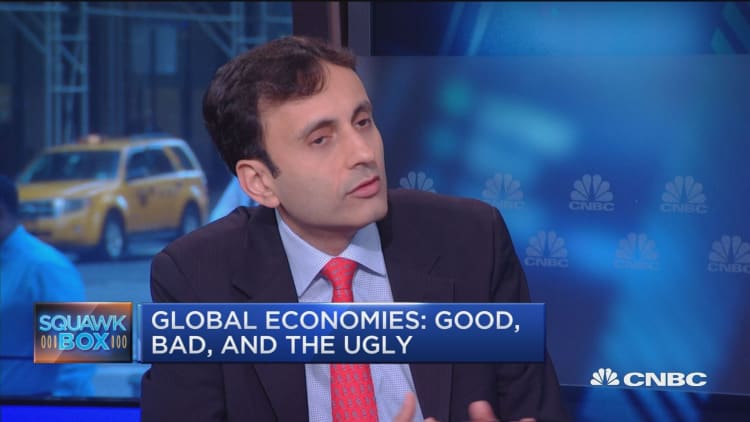
Billionaires in the United States have much better reputations than their counterparts in Russia, Mexico, Brazil and many other countries around the world, a leading global markets strategist told CNBC on Monday.
And that's given presumptive GOP presidential nominee Donald Trump runway to possibly capture the highest office in the land, said Ruchir Sharma, head of emerging markets and chief global strategist at Morgan Stanley Investment Management.
Sharma told CNBC's "Squawk Box" the rise of Trump comes despite the heated debate on wealth inequality in the 2016 election, aggressively pursued by Democratic candidate Bernie Sanders and to a lesser extent front-runner Hillary Clinton.
In his new book "The Rise and Fall of Nations," about how to gauge the prospects of countries, Sharma talks about "good billionaires," self-made entrepreneurs and "bad billionaires," those who built their fortunes by leveraging political connections or family fortunes.
Trump's record is mixed, Sharma wrote in the book, without calling him a "good" or a "bad" billionaire. The real estate mogul is a "gray line," Sharma told CNBC Monday, without elaborating.
Sharma said it's remarkable that Trump's billionaire status is not being held against him.
"In any other country, especially in the emerging markets, a character who's rising so fast in the polls, the financial markets, would be in complete panic out there," he said. "You would have a collapse in the stock markets. You would have a run on the currency."
The reason that's not happening in the U.S. this election cycle, according to Sharma, is there's faith in the American system of government. "The checks and balances are so strong, that when it comes to power, it wouldn't make much of a difference" who wins the presidency.
"There's no way a billionaire in Russia, Mexico, Brazil [or] even India would be able to make a run for the top office, because they're so vilified in those countries," he argued.
One area of concern in the U.S., however, is the increase in the amount of wealth being concentrated among billionaires, Sharma said.
"Historically, the wealth of billionaires in this country has been 10 percent of the economy, about 10 percent of GDP," he said. "Since 2009, that's exploded. And today, we're at 15 percent in this country. The second-highest in the world after Russia."
He blamed the Federal Reserve. "The Fed's easy money policies since the 2008 financial crisis have really turbocharged the inequality in this country."
Next downturn going to be 'made in China'

Sharma also issued a warning about China's soaring debt load and the repercussions of leverage on world economies.
"Every single downturn in history has been led by the United States. I think that the next downturn is going to be 'made in China,' like everything else these days," he said.
"Every single economic boom has come to an end when a country takes on too much debt. And that's what China has done," he argued, calling the phenomenon "the kiss of debt."
"No developing country in history has taken on as much China has taken on since 2008," he said, adding Chinese debt level were relatively stable before the financial crisis.
"Then they went crazy after that," he continued, "trying to grow at this unrealistic target of 7 [or] 8 percent, even though the rest of the world was slowing down."
Sharma said it currently takes $6 of debt to create $1 of economic growth in China. "Just to put this in perspective, at the peak of the U.S. housing bubble in 2007 and 2008, it was taking $3 of debt to create $1 of GDP growth in the United States."


